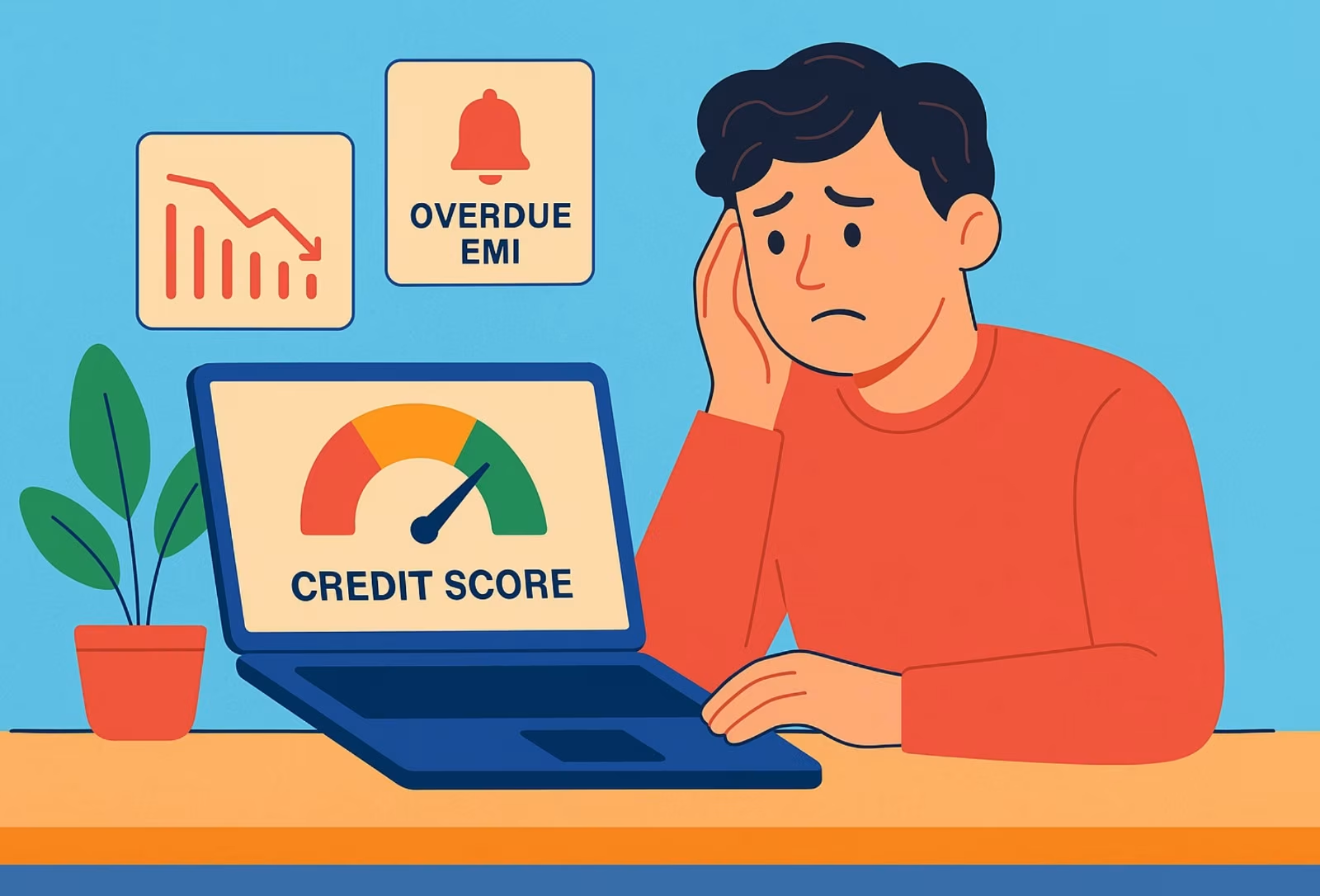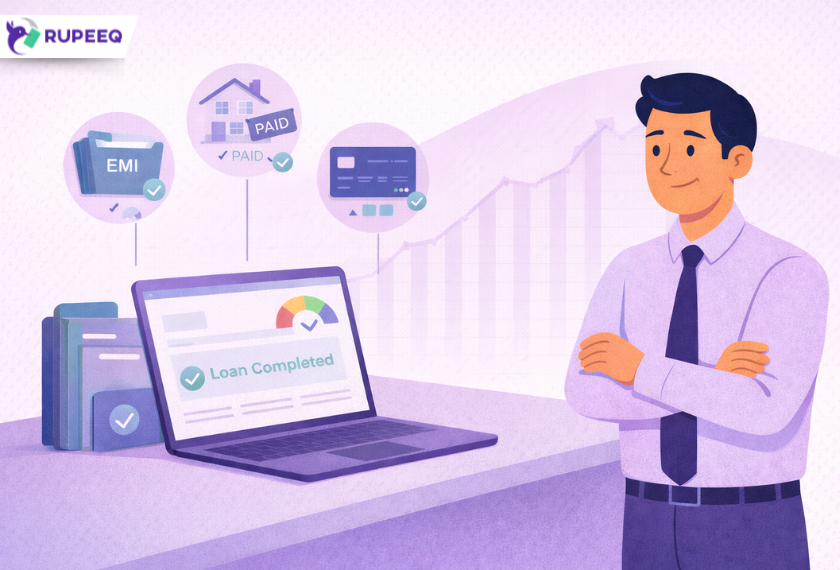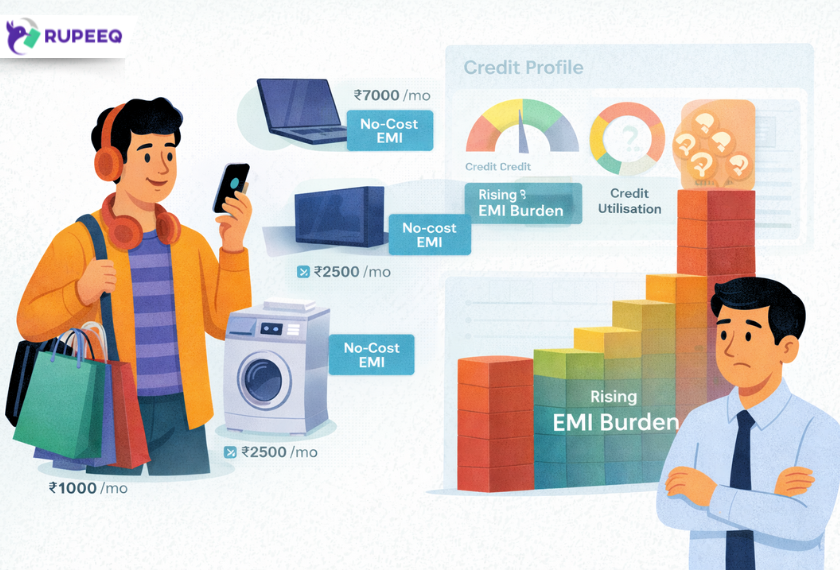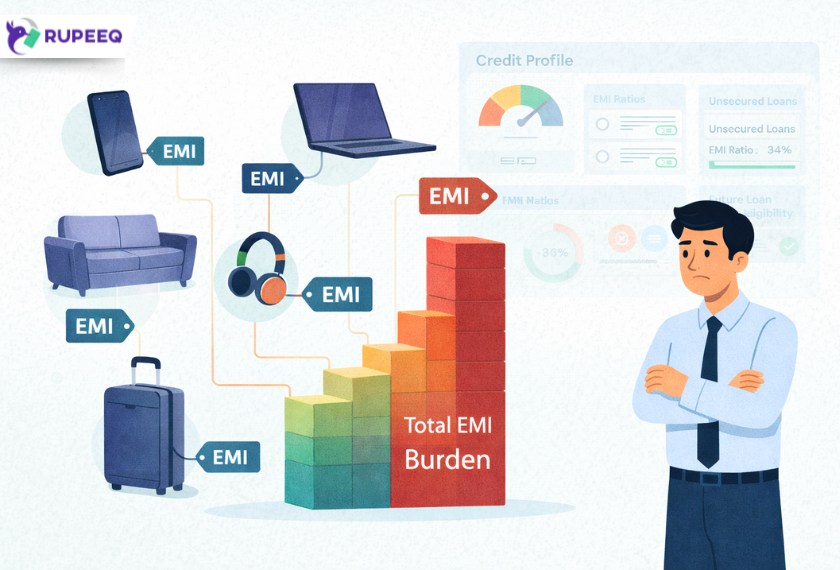Your CRIF credit score is a reflection of your credit health, and it plays a significant role in how banks and NBFCs evaluate your loan applications. One of the fastest ways to damage that score is by missing your Equated Monthly Installments (EMIs)—even a single missed payment can reduce your score and affect your future borrowing ability.
In this blog, we’ll explain how missed EMIs impact your CRIF credit score, how long the damage can last, and what you can do to avoid or fix it.
What Is Considered a Missed EMI?
A missed EMI occurs when you fail to pay your monthly loan or credit card installment on or before the due date. This can happen due to oversight, insufficient funds, or financial stress.
Lenders usually provide a short grace period (1–5 days), but if payment is not made beyond that, it is reported to credit bureaus like CRIF Highmark.
RupeeQ Tip: Even if the lender doesn’t immediately penalize you, your missed EMI can still get reported to CRIF and impact your score for months.
How Missed EMIs Affect Your CRIF Credit Score
1. Drop in Credit Score
Your payment history accounts for over 35% of your credit score calculation. When you miss an EMI:
- CRIF receives this information from the lender during the monthly update.
- A default or late payment entry appears in your credit report.
- Your score may drop by 50 to 100 points depending on the severity and frequency of missed payments.
Example:
If you had a CRIF score of 765 and missed an EMI on your personal loan, your score might fall to around 690–710 after the report update. Multiple missed EMIs can bring it down further.
2. “Days Past Due” (DPD) Entry on Report
Your credit report includes a section called DPD (Days Past Due) which records how many days you were late in making payments each month.
- A “000” entry means payment was made on time.
- A “30” or “60” means payment was 30 or 60 days late.
This DPD history remains in your report for 36 months, even after you repay the overdue amount.
3. Difficulty Getting New Loans or Credit Cards
Lenders check full CRIF credit score, not just your score. A recent history of missed EMIs:
- Reduces the chance of getting fresh credit approvals.
- Signals poor repayment behavior.
- May result in smaller loan amounts or higher interest rates.
RupeeQ Tip: If you’ve missed EMIs in the past, check your CRIF report on RupeeQ and use ACE insights to understand how many points you’ve lost and what you can do to regain them.
📥 Get Free Instant Credit Report
Impact Based on Type of Loan
Missed EMIs impact your CRIF score differently depending on the loan type.
| Loan Type | Impact of Missed EMI |
| Personal Loan | High impact (unsecured loan) |
| Home Loan | Medium impact (secured loan, long term) |
| Credit Card | High impact (frequent reporting cycles) |
| Education Loan | Medium impact (repayment starts post-moratorium) |
| Gold Loan | Medium to low, but still reported |
Example:
Missing a ₹2,500 EMI on a credit card can hurt your score as much as missing a ₹10,000 EMI on a home loan—because unsecured credit like credit cards is weighed more heavily in scoring algorithms.
Repeated Missed EMIs vs. Single Miss
A single missed EMI can be recovered from quickly if it’s an isolated case and you resume paying on time.
Multiple missed EMIs (especially back-to-back) indicate chronic repayment issues and have:
- Stronger negative impact
- Longer recovery time
- Higher likelihood of the account being marked as NPA (Non-Performing Asset)
RupeeQ Tip: If you’ve missed more than one EMI recently, start by clearing the oldest overdue first. This helps reduce the DPD aging on your report.
How Long Does the Impact Last?
- A missed payment remains visible in your CRIF credit report for up to 36 months.
- The score impact usually softens after 6–12 months of consistent, timely payments.
- The more time that passes without further missed EMIs, the faster your score begins to recover.
How to Minimize the Damage of Missed EMIs
- Pay the overdue EMI as soon as possible. The longer you delay, the worse it gets.
- Speak to your lender. If you’re facing financial trouble, ask about restructuring or converting dues into smaller EMIs.
- Avoid missing future EMIs. Set up auto-debit or timely reminders to avoid unintentional defaults.
- Check your CRIF report. Ensure the overdue is marked “paid” after settlement.
RupeeQ Tip: After clearing your dues, monitor your credit score on RupeeQ monthly to confirm that your repayment is updated and your score is recovering.
Can You Remove a Missed EMI from Your Report?
You cannot erase accurate information from your CRIF credit report. However, if the missed EMI was due to:
- Technical error
- Incorrect reporting by the lender
- A payment you actually made on time
Then you can raise a dispute with CRIF via their official website or through the RupeeQ platform.
If your claim is valid, CRIF will correct the entry within 30 days.
What If You Anticipate Missing an EMI?
- Contact your lender in advance and explain the situation.
- Ask about deferring the EMI or switching to a smaller installment temporarily.
- Explore loan restructuring options (many were offered during COVID-19).
Proactive communication helps you avoid negative reporting in the first place.
Conclusion
Missed EMIs can have a serious and lasting impact on your CRIF credit score. Even one late payment can knock dozens of points off your score, and repeated defaults can derail your chances of getting credit in the future.
The best way to protect your credit health is by staying disciplined with repayments and checking your score regularly. With RupeeQ ACE, you can monitor your CRIF score for free, get actionable tips, and correct errors in your report before they do further damage.
Good credit health starts with good habits—and it’s never too late to rebuild.
Frequently Asked Questions
Can one missed EMI affect my CRIF score?
Yes. A single missed EMI can lower your score by 50–100 points, depending on your credit profile and history.
How many missed EMIs before my account is marked as a default?
Generally, lenders mark an account as NPA (Non-Performing Asset) after 90 days of non-payment (i.e., 3 missed EMIs).
Will my score improve immediately after I pay the overdue EMI?
Your score may not improve instantly, but consistent on-time payments over the next few months will help it recover.
Can I remove a missed EMI from my report if it was a mistake?
If it was wrongly reported, yes. Raise a dispute with CRIF via their site or through RupeeQ.
How do I prevent accidental missed EMIs?
Use auto-debit facilities, EMI reminders, and check your upcoming dues on your bank’s app or loan account dashboard.







